We should be looking at what benefits the customer. It seems many are coming here because they say the locals are friendly. That's a strong selling point."
Now there’s a brand new idea from Hawaii’s brain trust—suck up to foreigners and pimp the locals
Friday, February 29, 2008 Tourism execs cast about for new ideas
Pacific Business News (Honolulu) - by Chad Blair Pacific Business News
At a meeting of tourism officials and industry stakeholders this week, the elephant in the room was a cruise ship.
Make that the absence of a cruise ship -- two, actually.
"What are we going to do with a quarter of a million fewer visitors?" asked Murray Towill, president of the Hawaii Hotel & Lodging Association. "No one really knows."
While Norwegian Cruise Line's pullout of two of its three ships from Hawaii received only passing discussion at the meeting of top tourism executives, the potential loss of 230,000 cruise visitors this year, on top of a worsening slump in overall visitor numbers, is forcing state tourism officials to reassess their marketing plans for the remainder of the year and for 2009.
The loss in cruise bookings as well as slackening visitor arrivals and spending could return Hawaii to pre-2000 arrival and expenditure levels.
At an all-day Hawaii Tourism Authority meeting at Turtle Bay Resort on Tuesday executives of Hawaii hotels, resorts, time shares, airlines and attractions viewed PowerPoint slides on visitor data and pitched ideas that could influence marketing plans.
For the rest of fiscal 2008, HTA already is making a renewed focus on marketing to North America. A majority of cruise ship passengers to Hawaii over the past five years came from Canada and the U.S. East.
"We're working out the details with our industry partners to help keep activity going even with NCL leaving," David Uchiyama, HTA's marketing director, told PBN.
HTA also is trying to attract more Japanese tourists, particularly multigenerational families and honeymooners, and to open up the Korean and Chinese markets.
In the meantime, HTA is mulling over the myriad marketing suggestions that came out of the brainstorming session and a follow-up meeting Wednesday.
Among the fixes discussed:
§ Split up the East Coast market for marketing. The U.S. East trails the U.S. West but is ahead of Japan as the largest source of Hawaii visitors.
It also is vast and diverse and includes every city east of the Rocky Mountains. Should Chicago and Dallas be marketed to the same as, say, Atlanta and New York City?
As Joseph Toy, president of Hospitality Advisors, repeatedly reminded the HTA, the U.S. East has historically been underpenetrated.
§ Don't forget the U.S. West. Ed Hubennette, area vice president for Japan, Hawaii and the South Pacific for Marriott International, asked whether the marketing emphasis on the U.S East and Asia will come at the expense of what's been Hawaii's greatest market.
"You have to go where the customers are," said Hubennette, who added that hotels were "popping up" all over Asia and the Middle East. "The world is rapidly changing, and we sometimes forget that as we struggle to keep up."
§ Play up Hawaii's strengths. Ernest Nishizaki, executive vice president of hotel owner Kyo-ya USA, said: "We should be looking at what benefits the customer. It seems many are coming here because they say the locals are friendly. That's a strong selling point."
HTA board member Kyoko Kimura agreed, noting that Japanese tourists are increasingly attracted to Hawaii's cultural and outdoor activities. Kimura is president and general manager of Diamond Resort Hawaii on Maui.
§ Reconsider what the "product" is. The word "segmentation" was used frequently at the HTA meeting. Should Kauai be marketed the same as the Big Island, or Maui the same as Oahu?
John Knox of John M. Knox & Associates said that research continues to reveal the Hawaii "brand" has mostly positive associations for visitors and residents alike.
"You don't want to throw the baby out with the bath water in cycle times," he said.
But that doesn't mean you can't rethink the sales demographics.
As Mitch Imanaka, the Hawaii chairman of American Resort & Lodging Association, asked: "Who is the preferred visitor? Can Hawaii continue to be all things to all people?"
§ Redefine Hawaii's "value." Even as the local industry has consolidated room inventory and spent billions of dollars on infrastructure, many believe there has been too much focus on high-end retail.
David Carey, president and CEO of Outrigger Enterprises Group, said for Japanese tourists the better shopping is in Tokyo, Seoul, Hong Kong and Beijing. Florida and Las Vegas are cheaper draws for U.S. tourists.
There remains among potential visitors a widely shared perception that Hawaii is too expensive.
"How do we measure Hawaii's true value, close the loop and make the sale?" asked Doug Chang, HTA chairman and longtime Maui hotelier. "We know that once they get over the sticker shock and come here, they see that Hawaii is a very good value."
§ Shift resources to the Internet. Korea has been described as the most "online nation," and if Hawaii wants to get the 122,000 Koreans that came here in 1997 -- before Korea's economic collapse and the Sept. 11 terrorist attacks -- it won't reach them through conventional advertising.
"I wouldn't be passing out brochures at a trade show," Carey said.
Most HTA officials already were aware of these ideas, and some have been incorporated into marketing strategies. Other ideas, such as refining visitor survey data to identify trends and studying the impact of the cruise industry, are under way.
cblair@bizjournals.com | 955-8036
behalf of keboi@aol.comDMZ-Hawaii@yahoogroups.com
All Posts (6434)
Sort by
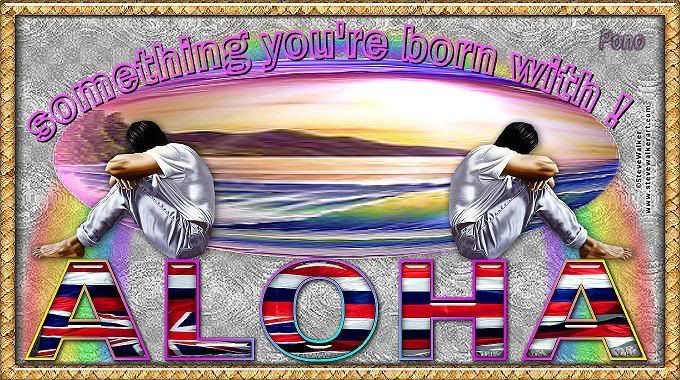
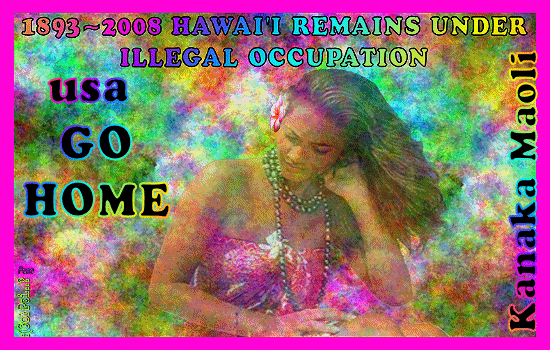
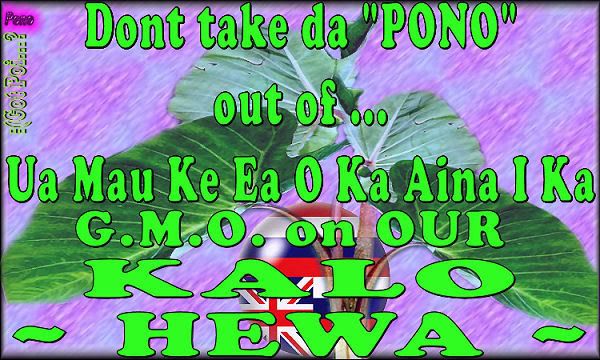 Protecting Local KnowledgeBy Léo Azambuja, Molokai Dispatch, 27 February 2008Bioprospecting commission seeks to regulate usage of Hawaii’s natural resources.Businesses across the globe are increasingly using native Hawaiian knowledge of Hawaii’s natural resources to produce food, cosmetics, and medicines. While it may seem like an eco-friendly way of facing the future, many in Hawaii are upset that their traditional knowledge is being stolen for commercial purposes.The idea of using local knowledge to create commercial products is called bioprospecting, according to Vicky Takamine, president of ..Ilio..ula o Kalani, a coalition committed to protecting Hawaiian customs and traditions.Takamine, along with the coalition’s executive director, Kaho..onei Panoke, held an informative meeting last week Monday at the Kulana ..Oiwi halau.“Every indigenous people have ownership of their own traditional knowledge,” Takamine said. “We own our knowledge.”The state of Hawaii has no regulations on bioprospecting, according to Takamine.The Legislature passed a resolution on 2006, creating a temporary bioprospecting commission, which Takamine and Panoke are part of. The commission has no funding, making it difficult to gather better input from la..au lapa..au from different islands.This year, Takamine and Panoke are lobbying for a senate bill that would create a funded temporary bioprospecting commission. The bill, SB 151, has already passed three senate committees, and is now referred to the Ways and Means (funding) committee.The temporary bioprospecting commission would expire in 2010, but it may eventually become permanent. It would operate under the Office of Hawaiian Affairs. Commissioners would be in charge of drafting a set of rules and regulations for bioprospecting, as well as a legal definition for bioprospecting.Panoke and Takamine said those interested in bioprospecting would have to receive permission from land owners, the state of Hawaii, and native Hawaiians before collecting samples. A part of revenues from commercialized products would be used to benefit Hawaiian communities.Takamine said rules would protect the intellectual rights of native Hawaiians, whose traditional practices have been handed down from la..au lapa..au for generations.Native Hawaiians are stewards of their natural resources, according to Takamine. She said they “need to work with the state of Hawaii to make sure there are rules and regulations affecting the gathering of those resources.”Don’t blame the kaloThe meeting also served for a brief discussion on a bill asking for a 10 year moratorium on genetic modified kalo.“We don’t want anyone messing with our kalo,” Takamine said.Takamine said SB 958 needs a hearing, and the community should call legislators requesting for it.“There’s a scientist in Hilo who continues to do scientific research on our kalo, taking genes from rice, wheat and grapes and injecting that into the kalo,” Takamine said. The scientist is trying to come up with a stronger variety of kalo, more resistant to pests such as the apple snail.“We didn’t ask them for that,” Takamine said. “Don’t blame the kalo, it’s not the kalo’s fault.”post fromNini'ane
Protecting Local KnowledgeBy Léo Azambuja, Molokai Dispatch, 27 February 2008Bioprospecting commission seeks to regulate usage of Hawaii’s natural resources.Businesses across the globe are increasingly using native Hawaiian knowledge of Hawaii’s natural resources to produce food, cosmetics, and medicines. While it may seem like an eco-friendly way of facing the future, many in Hawaii are upset that their traditional knowledge is being stolen for commercial purposes.The idea of using local knowledge to create commercial products is called bioprospecting, according to Vicky Takamine, president of ..Ilio..ula o Kalani, a coalition committed to protecting Hawaiian customs and traditions.Takamine, along with the coalition’s executive director, Kaho..onei Panoke, held an informative meeting last week Monday at the Kulana ..Oiwi halau.“Every indigenous people have ownership of their own traditional knowledge,” Takamine said. “We own our knowledge.”The state of Hawaii has no regulations on bioprospecting, according to Takamine.The Legislature passed a resolution on 2006, creating a temporary bioprospecting commission, which Takamine and Panoke are part of. The commission has no funding, making it difficult to gather better input from la..au lapa..au from different islands.This year, Takamine and Panoke are lobbying for a senate bill that would create a funded temporary bioprospecting commission. The bill, SB 151, has already passed three senate committees, and is now referred to the Ways and Means (funding) committee.The temporary bioprospecting commission would expire in 2010, but it may eventually become permanent. It would operate under the Office of Hawaiian Affairs. Commissioners would be in charge of drafting a set of rules and regulations for bioprospecting, as well as a legal definition for bioprospecting.Panoke and Takamine said those interested in bioprospecting would have to receive permission from land owners, the state of Hawaii, and native Hawaiians before collecting samples. A part of revenues from commercialized products would be used to benefit Hawaiian communities.Takamine said rules would protect the intellectual rights of native Hawaiians, whose traditional practices have been handed down from la..au lapa..au for generations.Native Hawaiians are stewards of their natural resources, according to Takamine. She said they “need to work with the state of Hawaii to make sure there are rules and regulations affecting the gathering of those resources.”Don’t blame the kaloThe meeting also served for a brief discussion on a bill asking for a 10 year moratorium on genetic modified kalo.“We don’t want anyone messing with our kalo,” Takamine said.Takamine said SB 958 needs a hearing, and the community should call legislators requesting for it.“There’s a scientist in Hilo who continues to do scientific research on our kalo, taking genes from rice, wheat and grapes and injecting that into the kalo,” Takamine said. The scientist is trying to come up with a stronger variety of kalo, more resistant to pests such as the apple snail.“We didn’t ask them for that,” Takamine said. “Don’t blame the kalo, it’s not the kalo’s fault.”post fromNini'ane
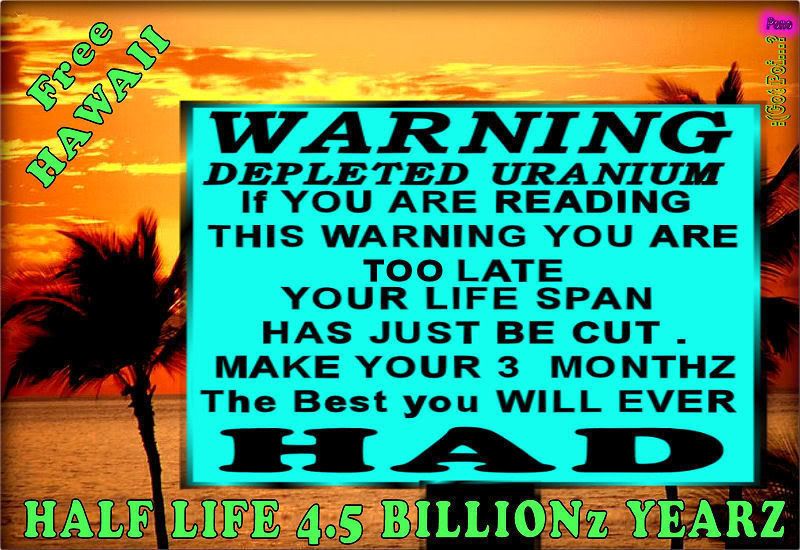
Organic Consumers POISONS Click HERE
Don't know if folks have seen this website/organization, but it is an alert of thecontamination of our food supply by the military.Perhaps a useful tool in organizing the general public on the dangers of militarism,weapons, etc.ALERT OF THE WEEK:STUDY SHOWS MILITARY POLLUTION POISONING U.S. FOOD SUPPLYA new analysis of data from the U.S. Centers for Disease Controlindicates that a toxic chemical in rocket fuel has severely contaminated thenation's food and water supply. Scientists warn that the chemical,known as perchlorate, could cause thyroid deficiency in more than 2.2million women of childbearing age. This thyroid deficiency could damage thefetus of pregnant women, if left untreated. Perchlorate, the explosiveingredient in solid rocket fuel, has leaked from military bases anddefense and aerospace contractors' plants in at least 22 states,contaminating drinking water for millions of Americans. Despite massivecomplaints, defense contractors such as Kerr-McGee have done little or nothingto clean up the pollution. Perchlorate has also been widely detected inmilk, lettuce, produce and other foods. In an alarming study, the CDCfound perchlorate in the urine of every person tested. The OCA hasmobilized thousands of organic consumers to pressure the EPA and governmentofficials to begin a massive clean up of perchlorate for over a year.Learn more and take action:http://www.organicconsumers.org/perchlorate.htmon behalf of pikopohakuDMZ-Hawaii@yahoogroups.com
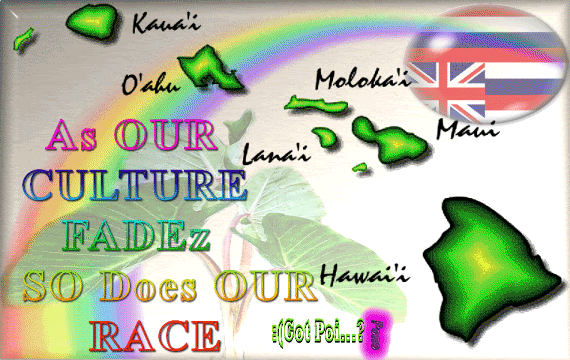
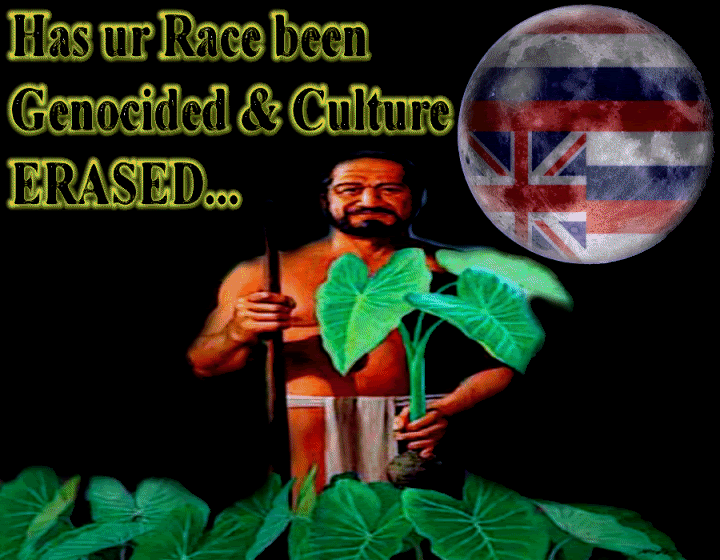
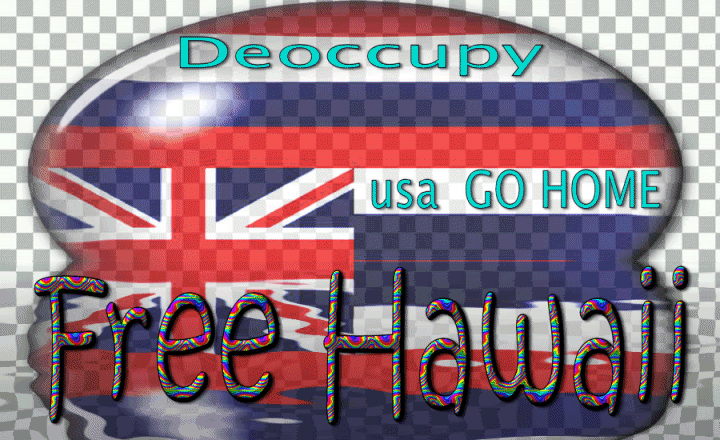 LOL...THIS SMELLS OF ANOTHER SOILED BANDAID Like "OHA", Placed on a Deep & Growing WOUND !THIS ISNT THE ANSWER, SOVEREIGNTY , DEOCCUPATION and REPARATIONS is a START, anything else is"BUISNESS AS USUAL" = CULTURAL & RACIAL GENOCIED TARGETED at da KANAKA MAOLI the TRUE CARETAKERS of da AINA "ILLEGALLY OCCUPIED and RULED by usa" , KINGDOM of HAWAI'I!!
LOL...THIS SMELLS OF ANOTHER SOILED BANDAID Like "OHA", Placed on a Deep & Growing WOUND !THIS ISNT THE ANSWER, SOVEREIGNTY , DEOCCUPATION and REPARATIONS is a START, anything else is"BUISNESS AS USUAL" = CULTURAL & RACIAL GENOCIED TARGETED at da KANAKA MAOLI the TRUE CARETAKERS of da AINA "ILLEGALLY OCCUPIED and RULED by usa" , KINGDOM of HAWAI'I!!Nini'ane Date: Feb 28, 2008 5:07 AM


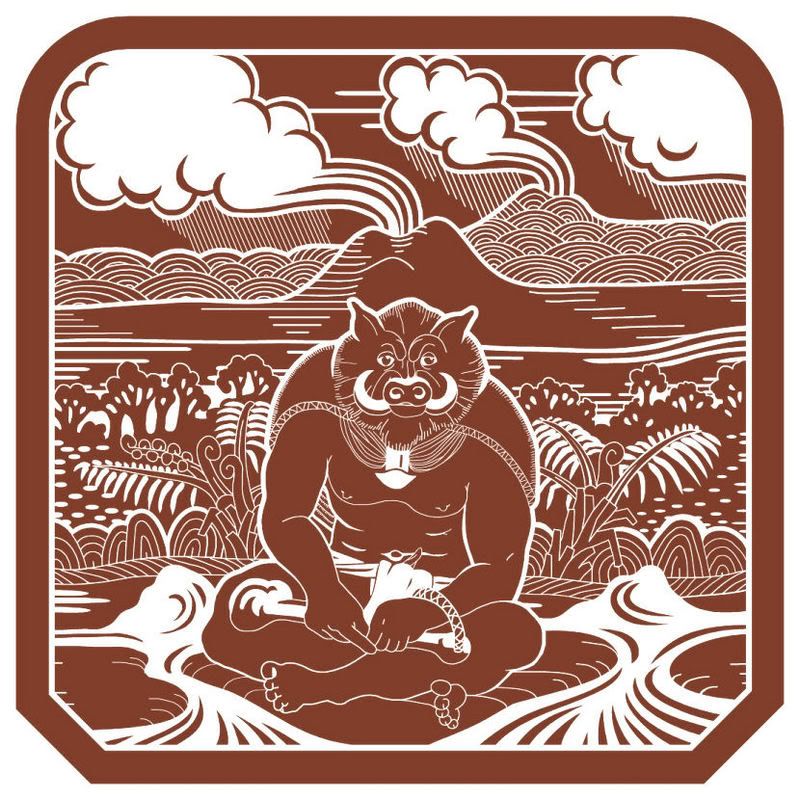
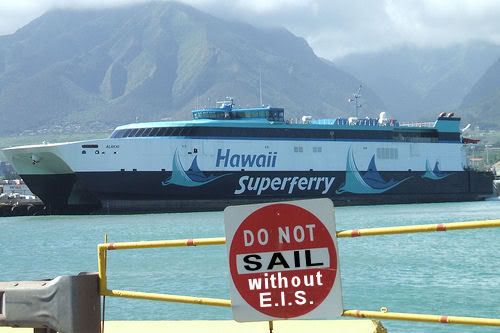
 FROM OPPERATING WITHOUT AN "E.I.S." ENVIORNMENTAL IMPACT STATEMENT , TO CREATING THEIR OWN =OIL SPILL ...DINGLE LINGLE TAKE A BOW ,WE HAVE YOU TO THANK FOR THISFROM: Island Breathhttp://homepage.mac.com/juanwilson/islandbreath/SUBJECT: SUPERFERRY DAMAGESOURCE: BRAD PARSONS mauibrad@hotmail.comPOSTED: 27 FEBRUARY 2008Did Superferry create oil spill off Ko Olina?Editor's Note: It would seem that the time-line and simplest explanation for the source of the oil spill is the accident that occurred getting the Superferry into dry dock. The hull was damaged, and may have been breached. The USCG should answer whether they have considered that possibility.-------------------------------------------------------------Coast Guard monitors oil spill off Ko OlinaHonolulu Advertiser, 23 February 2008A three-mile-long oil sheen off the coast of West O'ahu chased dozens of people from the beaches of Ko Olina Resort today, but did not appear to cause significant environmental damage or injuries, officials said.The Coast Guard estimated the spill at 500 gallons and was monitoring the sheen as it moved westward late this afternoon and was trying to determine its source. Investigators said the sheen appears to be similar to a diesel-like marine fuel that evaporates quickly, said Coast Guard Lt. John Titchen.About 150 people using the beaches and lagoons at Ko Olina late this morning were asked to stay away from the water, Titchen said. Most then left the beach area voluntarily.Some beachgoers in the area reported a strong smell of diesel fuel; others said they could feel a light touch of oil on their skin. No one was injured, according to the Honolulu Fire Department. The oil sheen was reported in the water of three of the four lagoons at Ko Olina, but had not come ashore anywhere else, Titchen said.-------------------------------------------------------------Spill spoils day at Ko OlinaHonolulu Advertiser, 24 February 2008An oil spill chased about 150 people from the lagoons of Ko Olina Resort yesterday, but did not appear to cause any significant injuries or environmental damage, officials said. The oil from an unknown source, estimated to be about 500 gallons, spread a light 3-mile sheen in the water from Barbers Point to Kahe Point, said Coast Guard Lt. John Titchen. It was moving west last night, he said.The Coast Guard was monitoring the spill with a helicopter, C-130 plane and a 47-foot boat last night. Using money from a national oil spill recovery fund, it also hired a local company, Pacific Environmental Corp., to lead cleanup efforts. The sheen came ashore at three of the lagoons at Ko Olina about 11 a.m., causing some people in the water to report a strong diesel smell in the air and a light touch of oil on their skin, officials said. Several people in Nanakuli also reported encountering the oil last night, he said.Titchen said the sheen appeared similar to marine diesel fuel, which evaporates fairly quickly. At least two other spills of a similar size and substance have been reported in Hawai'i waters in the past year, he said. No one was seriously injured, said Honolulu Fire Department Capt. Terry Seelig. Security personnel at Ko Olina walked the beaches yesterday advising people to stay out of the water. By late afternoon the beachfront lagoons, which normally have hundreds of people on a sunny Saturday afternoon, were all but deserted."The good news is there's plenty of parking, and we got a cabana for shade," said Yvonne Walker of Salt Lake, who came to the beach with family members, including 5-month-old granddaughter, Milanna, who was making her first visit to any beach. "A lot of people went home, but we're just not going in the water," said Walker's daughter, Amber. "When we get hot, we go use the showers."The Coast Guard was working last night to determine the source of the spill, Titchen said. The state Health Department also was investigating. "It's mostly offshore at this point, but there is some shoreline impact," said Coast Guard Petty Officer 1st Class Aaron Cameron. "We'll be out here working to ensure there is as little impact to the environment as possible."-------------------------------------------------------------Source of 500-gallon oil spill is unknownHonolulu Advertiser, 25 February 2008Coast Guard pollution investigators reported yesterday that an oil slick off Ko Olina, along the Wai'anae Coast, has mostly dissipated and had little impact on the shoreline. The cause of the slick remained under investigation. The estimated 500-gallon spill of marine diesel fuel caused a 3-mile slick between Barbers Point and Nanakuli Saturday.Swimming lagoons at Ko Olina Resort were evacuated by resort security personnel as a precaution. The Coast Guard and state agencies are working to find the source of the spill. Pacific Environmental Corp. has been hired to do any necessary cleanup. No visible shoreline damage has been reported.Minor vessel damage has been reported. Boat owners with questions are urged to call the Coast Guard at 808-842-2672 for more information.-------------------------------------------------------------Did tug seriuously damage Superferry?by Bill Schultz on 20 February 2008Editor's Note: The following report was held until a partial confirmation was available from the Honolulu Advertiser. This story, if true, is more bad news for the future operation of the Superferry.I just heard an unconfirmed report from a sea-faring friend on Maui. She says the ferry was being towed into drydock when the lines parted. She went aground and got stuck in the mud. A tug was called to push her off. It pushed a big hole in the side, damaging two of her ribs and at least two of the decks. Major repairs. Cursed ship. Have you heard anything about this?-------------------------------------------------------------Superferry Drydock extended 3 weeksHonolulu Advertiser, 20 February 2008The Hawaii Superferry will remain in drydock until March 24, three weeks longer than originally planned. Superferry officials said today the extended drydock time is needed to repair damage to the Alakai's hull that occurred during the drydocking process and additional maintenance needs have been identified. The Alakai was originally scheduled to resume service on March 3rd.Reservations for the March 25 sailing and beyond are now being accepted. Superferry officials said passengers holding reservations for affected voyages are being notified, re-accommodated on a future voyage or refunded.-------------------------------------------------------------Were Superferry Harbor Designs Rushedby Bill Schultz on 20 February 2008I was looking for information to confirm or deny the rumored damage to the HSF and came across this useful site:http://www6.hawaii.gov/spo2/emergency/You'll find an emergency requisition request for the services of a Naval architect regarding a barge in Kahului. It's:http://www6.hawaii.gov/spo2/emergency/attachments/emerg99.pdfI thought it odd that the requirements and scope of work require that the findings 'shall support assurances that the operations of state owned equipment are in the interest of safety of the operators and the general public', that the report should 'Provide load calculation, stamped by a professional engineer, for the Kahlui barge soft line mooring system SHOWING THE ADEQUACY AND INTEGRITY OF THE LINES AND MOORING SYSTEM' (emphasis added) and furthur that 'The calculations should be based on the basis of the original mooring system'.Apparently, the state had not previously had the load calculations performed by a professional naval architect or they would have simply produced the document at the CG's request after the barge broke loose and the bollards were sheered off.Would a reputable naval architect agree to the terms of the requested report given that the calculations had not yet been performed but the results are already specified?Why was the no-bid work awarded to a company as far away as Alexandria, VA when another emergency procurement regarding naval architect services and the barge evaluation was awarded to a local company on the same day? See:http://www6.hawaii.gov/spo2/emergency/attachments/emerg98.pdfWhy would the winner of the $12,000.00 contract agree to these terms unless they had some interest in getting the HSF into service at the earliest possible date?The company is Alion Science and Technology, rated number 79 in the top 100 defense contractors of 2007.The same company whose declared growth strategy includes 'we anticipate expanding our support to the U.S. Navy in new ship systems such as DD(x) and LCS'. "LCS" is navspeak for "Littoral Combat Ship". This quote is from the 10-K filed with the Securities and Exchange commision and can be found at:http://www.secinfo.com/dsvRq.vdf.htmThe same company whose chief science advisor is retired Admiral Edward Lindquist, one of the most prolific writers and outspoken advocates of LCS development.http://www.marinelink.com/Story/LCS+Mission+Packages+Being+Assembled,+Tested+at+ Panama+City-202603.htmlhttp://www.shipbuilding.com/Story/ShowStory.aspx?StoryID=208251http://www.nedsjotw.com/blog/DefenseJobs/EyeontheNavy/_archives/2006/5/17/2530657.htmlI haven't found what I was looking for yet but I thought you'd be interested in this revoltin' development.-------------------------------------------------------------Carlyle Group Dry Dock for Superferryby Juan Wilson on 9 February 2008Unconfirmed report from Hector Ryzak is that the Superferry Alakai is in a dry dock owned by Marisco near Barbers Point on Oahu. Marisco is owned by the Carlyle Group (Bush family multinational corporation). In the GoogleEarth image above the dry dock is the large barge-like vessel moored near the white roofed building. In GoogleEarth it scales over 500 feet long by over 100 feet wide. That is ample to handle the Superferry.A controversy has followed the dry dock's move from Alaska to Hawaii in 2001. See http://www.schlosserlawfiles.com/TDX-BSE/IslandDealtEconomicBlow.htmThis document, on the internet, from the law firm of Morisset, Schlosser, Jozwiak & McGaw states:REMOTE ISLAND DEALT ECONOMIC BLOWSAn impoverished Alaskan island in the Bering Sea faces economic catastrophe if the federal government succeeds in pressing proposed economic sanctions against it. These documents show the tortured paper trail of Tanadgusix Corporation’s (TDX) acquisition of the de-commissioned Navy drydock Ex-Competent for use in Hawaii, which has led to this peril......Matters turned threatening on September 26, 2003, when the United States filed a complaint against TDX and Marisco charging them with making false statements to obtain federal property, an action under the Federal False Claims Act that seeks damages of more than $15 million dollars, for a drydock the Navy classes as scrap.For details about Marisco visit:http://www.globalsecurity.org/military/facility/marisco.htmThey say of themselves:Marisco is one of the largest marine and industrial services companies in Hawaii. The facility is located at the Barbers Point Deep Draft Harbor near Campbell Industrial Park, Kapolei, Hawaii. The firm offers a wide spectrum of services including drydocking, machining, welding, blasting, painting, environmental cleanup, pipefitting, rigging, machinery troubleshooting and repairs. Marisco operates the largest commercial drydock and biggest industrial machine shop in the state. Marisco serves the governmental, commercial marine and industrial sectors of Hawaii. The governmental sector includes U. S. Navy, U. S. Coast Guard, and Military Sealift Command work.The local ship repair industry hit a low point after Navy jobs began to dry up. In the past, Navy work amounted to 60 to 70 percent of the business of the island's two largest private yards -- Honolulu Shipyard and Marisco Ltd. Budget cuts in recent years meant Navy contracts went from $37 million in 1995 to $13 million in 1999.Company founder Alfred Anawati established Marsico in 1972. In April 2001 United States Marine Repair (USMR), America's largest non-nuclear ship repair, modernization, overhaul and conversion company, signed a letter of intent to buy Marisco, Ltd., one of only two full-service shipyards in Hawaii. The acquisition gave USMR a strong local presence and an additional facility in which to perform work for the U.S. government and commercial customers. A company statement pointed to the increased demand for U.S. Navy fleet modernization, including the need for more surface ship work on cruisers and destroyers home ported in Pearl Harbor. USMR shipyards are located in San Diego, San Pedro and San Francisco, Calif.; Norfolk, Va., the company's corporate headquarters; and Ingleside, Tex.The Carlyle Group, a Washington, D.C.-based investment firm, owned USMR. Frank C. Carlucci, former secretary of defense and assistant to the president for national security affairs under President Reagan is the chairman of Carlyle. James A. Baker, III, who has served as the 61st secretary of state in the Bush Administration and in other senior levels of the US government under three different presidents, is also a principal in The Carlyle Group. The acquisition closed in mid-June 2001.-------------------------------------------------------------Superferry to go to dry dock to fix ruddersEditor's Note: HSF was forced to remove the rudders after determining the extent of damage. I maintain that the little evidence we have suggests the rudder damage caused the ship to take on water. Temporary removal of the rudders and "patching" the damage did not work. The Alakai's was not stable enough to operate and has forced HSF into a three week dry dock for structural repairs. Without additional engineering, I would suggest that this will not be more than a temporary solution. Austal's (ship builder) website indicates that the original structural engineering was 'optimized" to reduce weight. This might mean the hull is designed like an eggshell and is close to limit of expected forces that can be applied to it. In illustration above note what appears to be auxilliary rudder at stern, and t-foil stabilizer near bow.Rough sailing forces Superferry on early breakby Dave Segal, Honolulu Star-Bulletin, 8 February 2008Hawaii Superferry, plagued by weather- and equipment-related shutdowns and low ridership levels, said yesterday it will place its 349-foot vessel into dry dock for nearly three weeks for maintenance and recertification by the U.S. Coast Guard. The company said the mandatory annual dry dock, originally scheduled for May, was moved up to Wednesday through March 2 to take advantage of the off-peak travel season and to make permanent repairs related to the ship's auxiliary rudders. Passengers holding reservations are being notified and will be reaccommodated on a future voyage or refunded.Hawaii Superferry, which restarted service Dec. 13 after a court-ordered shutdown in August over environmental concerns, had based its break-even business model on carrying an average of 400 passengers and 110 vehicles per trip. But the numbers to date have been far below those levels, in part because the restart of service was hampered by heavy winter seas.An exhibit filed by state Deputy Attorney General William Wynhoff with Maui Circuit Court on Jan. 31 showed that the number of passengers booked during January between Honolulu and Maui ranged from 83 to 349 on days that the Superferry actually operated. The number of vehicles for those days ranged from 19 on the 6:30 a.m. New Year's Day voyage to as many as 94 vehicles.The Superferry did not operate for seven days in January -- Jan. 16-17 and Jan. 27-31 -- due to weather conditions and rudder-related repairs, but bookings were nevertheless still shown for those days in the court filing -- with one day showing as few as seven passengers and four other days with 20 or fewer passengers.Terry O'Halloran, director of business development for the Superferry, said that the Superferry has not carried "anything close to those low numbers." The numbers filed with the court were bookings and "not actual numbers," he said."They're a snapshot of our booking report," O'Halloran said. "They're not accurate numbers. Passengers are booking relatively close to the time of travel, so at no time did we book anywhere close to the low numbers shown on there. Those (low) numbers say to me they were taken several days before those dates because those numbers reflect early bookings."O'Halloran said that he did not have exact daily counts available, but that the 83-to-349 range produced in the exhibit on the days of operation sounded "about right.""With any startup, you have a ramp-up period before you get to the number that you're anticipating, and we definitely want to see higher numbers," he said. "But we're not disappointed with the numbers we're currently having, especially in consideration of starting up in the winter season. We're looking forward to having the boat come out of dry dock in great shape and getting back into service and providing the service that we intended for the people of Hawaii."O'Halloran said the Superferry had planned on being idled for 2 to 3 percent of the time during the winter season due to inclement weather but that the downtime for the rudder repairs was unexpected. He said the rudders, which are used to improve passenger comfort and fuel efficiency, were removed for an interim repair but that the Superferry found that without them the ride suffered."So we thought we'd just move up the timetable and do permanent repairs on the rudders and maximize our passenger comfort and take care of our annual dry-dock requirement at the same time," O'Halloran said. O'Halloran said construction "is a little bit ahead of schedule" in Mobile, Ala., on the Superferry's second vessel, which is scheduled to go into service in early 2009. "We're committed to Hawaii and to the long term for providing this alternative form of interisland travel," he said. "The second vessel will allow us to connect all of the islands and provide a level of service greater than we can provide with one vessel." O'Halloran said the Superferry is still looking at beginning a second daily voyage to Maui beginning this spring. It has yet to set a date when service will resume to Kauai.
FROM OPPERATING WITHOUT AN "E.I.S." ENVIORNMENTAL IMPACT STATEMENT , TO CREATING THEIR OWN =OIL SPILL ...DINGLE LINGLE TAKE A BOW ,WE HAVE YOU TO THANK FOR THISFROM: Island Breathhttp://homepage.mac.com/juanwilson/islandbreath/SUBJECT: SUPERFERRY DAMAGESOURCE: BRAD PARSONS mauibrad@hotmail.comPOSTED: 27 FEBRUARY 2008Did Superferry create oil spill off Ko Olina?Editor's Note: It would seem that the time-line and simplest explanation for the source of the oil spill is the accident that occurred getting the Superferry into dry dock. The hull was damaged, and may have been breached. The USCG should answer whether they have considered that possibility.-------------------------------------------------------------Coast Guard monitors oil spill off Ko OlinaHonolulu Advertiser, 23 February 2008A three-mile-long oil sheen off the coast of West O'ahu chased dozens of people from the beaches of Ko Olina Resort today, but did not appear to cause significant environmental damage or injuries, officials said.The Coast Guard estimated the spill at 500 gallons and was monitoring the sheen as it moved westward late this afternoon and was trying to determine its source. Investigators said the sheen appears to be similar to a diesel-like marine fuel that evaporates quickly, said Coast Guard Lt. John Titchen.About 150 people using the beaches and lagoons at Ko Olina late this morning were asked to stay away from the water, Titchen said. Most then left the beach area voluntarily.Some beachgoers in the area reported a strong smell of diesel fuel; others said they could feel a light touch of oil on their skin. No one was injured, according to the Honolulu Fire Department. The oil sheen was reported in the water of three of the four lagoons at Ko Olina, but had not come ashore anywhere else, Titchen said.-------------------------------------------------------------Spill spoils day at Ko OlinaHonolulu Advertiser, 24 February 2008An oil spill chased about 150 people from the lagoons of Ko Olina Resort yesterday, but did not appear to cause any significant injuries or environmental damage, officials said. The oil from an unknown source, estimated to be about 500 gallons, spread a light 3-mile sheen in the water from Barbers Point to Kahe Point, said Coast Guard Lt. John Titchen. It was moving west last night, he said.The Coast Guard was monitoring the spill with a helicopter, C-130 plane and a 47-foot boat last night. Using money from a national oil spill recovery fund, it also hired a local company, Pacific Environmental Corp., to lead cleanup efforts. The sheen came ashore at three of the lagoons at Ko Olina about 11 a.m., causing some people in the water to report a strong diesel smell in the air and a light touch of oil on their skin, officials said. Several people in Nanakuli also reported encountering the oil last night, he said.Titchen said the sheen appeared similar to marine diesel fuel, which evaporates fairly quickly. At least two other spills of a similar size and substance have been reported in Hawai'i waters in the past year, he said. No one was seriously injured, said Honolulu Fire Department Capt. Terry Seelig. Security personnel at Ko Olina walked the beaches yesterday advising people to stay out of the water. By late afternoon the beachfront lagoons, which normally have hundreds of people on a sunny Saturday afternoon, were all but deserted."The good news is there's plenty of parking, and we got a cabana for shade," said Yvonne Walker of Salt Lake, who came to the beach with family members, including 5-month-old granddaughter, Milanna, who was making her first visit to any beach. "A lot of people went home, but we're just not going in the water," said Walker's daughter, Amber. "When we get hot, we go use the showers."The Coast Guard was working last night to determine the source of the spill, Titchen said. The state Health Department also was investigating. "It's mostly offshore at this point, but there is some shoreline impact," said Coast Guard Petty Officer 1st Class Aaron Cameron. "We'll be out here working to ensure there is as little impact to the environment as possible."-------------------------------------------------------------Source of 500-gallon oil spill is unknownHonolulu Advertiser, 25 February 2008Coast Guard pollution investigators reported yesterday that an oil slick off Ko Olina, along the Wai'anae Coast, has mostly dissipated and had little impact on the shoreline. The cause of the slick remained under investigation. The estimated 500-gallon spill of marine diesel fuel caused a 3-mile slick between Barbers Point and Nanakuli Saturday.Swimming lagoons at Ko Olina Resort were evacuated by resort security personnel as a precaution. The Coast Guard and state agencies are working to find the source of the spill. Pacific Environmental Corp. has been hired to do any necessary cleanup. No visible shoreline damage has been reported.Minor vessel damage has been reported. Boat owners with questions are urged to call the Coast Guard at 808-842-2672 for more information.-------------------------------------------------------------Did tug seriuously damage Superferry?by Bill Schultz on 20 February 2008Editor's Note: The following report was held until a partial confirmation was available from the Honolulu Advertiser. This story, if true, is more bad news for the future operation of the Superferry.I just heard an unconfirmed report from a sea-faring friend on Maui. She says the ferry was being towed into drydock when the lines parted. She went aground and got stuck in the mud. A tug was called to push her off. It pushed a big hole in the side, damaging two of her ribs and at least two of the decks. Major repairs. Cursed ship. Have you heard anything about this?-------------------------------------------------------------Superferry Drydock extended 3 weeksHonolulu Advertiser, 20 February 2008The Hawaii Superferry will remain in drydock until March 24, three weeks longer than originally planned. Superferry officials said today the extended drydock time is needed to repair damage to the Alakai's hull that occurred during the drydocking process and additional maintenance needs have been identified. The Alakai was originally scheduled to resume service on March 3rd.Reservations for the March 25 sailing and beyond are now being accepted. Superferry officials said passengers holding reservations for affected voyages are being notified, re-accommodated on a future voyage or refunded.-------------------------------------------------------------Were Superferry Harbor Designs Rushedby Bill Schultz on 20 February 2008I was looking for information to confirm or deny the rumored damage to the HSF and came across this useful site:http://www6.hawaii.gov/spo2/emergency/You'll find an emergency requisition request for the services of a Naval architect regarding a barge in Kahului. It's:http://www6.hawaii.gov/spo2/emergency/attachments/emerg99.pdfI thought it odd that the requirements and scope of work require that the findings 'shall support assurances that the operations of state owned equipment are in the interest of safety of the operators and the general public', that the report should 'Provide load calculation, stamped by a professional engineer, for the Kahlui barge soft line mooring system SHOWING THE ADEQUACY AND INTEGRITY OF THE LINES AND MOORING SYSTEM' (emphasis added) and furthur that 'The calculations should be based on the basis of the original mooring system'.Apparently, the state had not previously had the load calculations performed by a professional naval architect or they would have simply produced the document at the CG's request after the barge broke loose and the bollards were sheered off.Would a reputable naval architect agree to the terms of the requested report given that the calculations had not yet been performed but the results are already specified?Why was the no-bid work awarded to a company as far away as Alexandria, VA when another emergency procurement regarding naval architect services and the barge evaluation was awarded to a local company on the same day? See:http://www6.hawaii.gov/spo2/emergency/attachments/emerg98.pdfWhy would the winner of the $12,000.00 contract agree to these terms unless they had some interest in getting the HSF into service at the earliest possible date?The company is Alion Science and Technology, rated number 79 in the top 100 defense contractors of 2007.The same company whose declared growth strategy includes 'we anticipate expanding our support to the U.S. Navy in new ship systems such as DD(x) and LCS'. "LCS" is navspeak for "Littoral Combat Ship". This quote is from the 10-K filed with the Securities and Exchange commision and can be found at:http://www.secinfo.com/dsvRq.vdf.htmThe same company whose chief science advisor is retired Admiral Edward Lindquist, one of the most prolific writers and outspoken advocates of LCS development.http://www.marinelink.com/Story/LCS+Mission+Packages+Being+Assembled,+Tested+at+ Panama+City-202603.htmlhttp://www.shipbuilding.com/Story/ShowStory.aspx?StoryID=208251http://www.nedsjotw.com/blog/DefenseJobs/EyeontheNavy/_archives/2006/5/17/2530657.htmlI haven't found what I was looking for yet but I thought you'd be interested in this revoltin' development.-------------------------------------------------------------Carlyle Group Dry Dock for Superferryby Juan Wilson on 9 February 2008Unconfirmed report from Hector Ryzak is that the Superferry Alakai is in a dry dock owned by Marisco near Barbers Point on Oahu. Marisco is owned by the Carlyle Group (Bush family multinational corporation). In the GoogleEarth image above the dry dock is the large barge-like vessel moored near the white roofed building. In GoogleEarth it scales over 500 feet long by over 100 feet wide. That is ample to handle the Superferry.A controversy has followed the dry dock's move from Alaska to Hawaii in 2001. See http://www.schlosserlawfiles.com/TDX-BSE/IslandDealtEconomicBlow.htmThis document, on the internet, from the law firm of Morisset, Schlosser, Jozwiak & McGaw states:REMOTE ISLAND DEALT ECONOMIC BLOWSAn impoverished Alaskan island in the Bering Sea faces economic catastrophe if the federal government succeeds in pressing proposed economic sanctions against it. These documents show the tortured paper trail of Tanadgusix Corporation’s (TDX) acquisition of the de-commissioned Navy drydock Ex-Competent for use in Hawaii, which has led to this peril......Matters turned threatening on September 26, 2003, when the United States filed a complaint against TDX and Marisco charging them with making false statements to obtain federal property, an action under the Federal False Claims Act that seeks damages of more than $15 million dollars, for a drydock the Navy classes as scrap.For details about Marisco visit:http://www.globalsecurity.org/military/facility/marisco.htmThey say of themselves:Marisco is one of the largest marine and industrial services companies in Hawaii. The facility is located at the Barbers Point Deep Draft Harbor near Campbell Industrial Park, Kapolei, Hawaii. The firm offers a wide spectrum of services including drydocking, machining, welding, blasting, painting, environmental cleanup, pipefitting, rigging, machinery troubleshooting and repairs. Marisco operates the largest commercial drydock and biggest industrial machine shop in the state. Marisco serves the governmental, commercial marine and industrial sectors of Hawaii. The governmental sector includes U. S. Navy, U. S. Coast Guard, and Military Sealift Command work.The local ship repair industry hit a low point after Navy jobs began to dry up. In the past, Navy work amounted to 60 to 70 percent of the business of the island's two largest private yards -- Honolulu Shipyard and Marisco Ltd. Budget cuts in recent years meant Navy contracts went from $37 million in 1995 to $13 million in 1999.Company founder Alfred Anawati established Marsico in 1972. In April 2001 United States Marine Repair (USMR), America's largest non-nuclear ship repair, modernization, overhaul and conversion company, signed a letter of intent to buy Marisco, Ltd., one of only two full-service shipyards in Hawaii. The acquisition gave USMR a strong local presence and an additional facility in which to perform work for the U.S. government and commercial customers. A company statement pointed to the increased demand for U.S. Navy fleet modernization, including the need for more surface ship work on cruisers and destroyers home ported in Pearl Harbor. USMR shipyards are located in San Diego, San Pedro and San Francisco, Calif.; Norfolk, Va., the company's corporate headquarters; and Ingleside, Tex.The Carlyle Group, a Washington, D.C.-based investment firm, owned USMR. Frank C. Carlucci, former secretary of defense and assistant to the president for national security affairs under President Reagan is the chairman of Carlyle. James A. Baker, III, who has served as the 61st secretary of state in the Bush Administration and in other senior levels of the US government under three different presidents, is also a principal in The Carlyle Group. The acquisition closed in mid-June 2001.-------------------------------------------------------------Superferry to go to dry dock to fix ruddersEditor's Note: HSF was forced to remove the rudders after determining the extent of damage. I maintain that the little evidence we have suggests the rudder damage caused the ship to take on water. Temporary removal of the rudders and "patching" the damage did not work. The Alakai's was not stable enough to operate and has forced HSF into a three week dry dock for structural repairs. Without additional engineering, I would suggest that this will not be more than a temporary solution. Austal's (ship builder) website indicates that the original structural engineering was 'optimized" to reduce weight. This might mean the hull is designed like an eggshell and is close to limit of expected forces that can be applied to it. In illustration above note what appears to be auxilliary rudder at stern, and t-foil stabilizer near bow.Rough sailing forces Superferry on early breakby Dave Segal, Honolulu Star-Bulletin, 8 February 2008Hawaii Superferry, plagued by weather- and equipment-related shutdowns and low ridership levels, said yesterday it will place its 349-foot vessel into dry dock for nearly three weeks for maintenance and recertification by the U.S. Coast Guard. The company said the mandatory annual dry dock, originally scheduled for May, was moved up to Wednesday through March 2 to take advantage of the off-peak travel season and to make permanent repairs related to the ship's auxiliary rudders. Passengers holding reservations are being notified and will be reaccommodated on a future voyage or refunded.Hawaii Superferry, which restarted service Dec. 13 after a court-ordered shutdown in August over environmental concerns, had based its break-even business model on carrying an average of 400 passengers and 110 vehicles per trip. But the numbers to date have been far below those levels, in part because the restart of service was hampered by heavy winter seas.An exhibit filed by state Deputy Attorney General William Wynhoff with Maui Circuit Court on Jan. 31 showed that the number of passengers booked during January between Honolulu and Maui ranged from 83 to 349 on days that the Superferry actually operated. The number of vehicles for those days ranged from 19 on the 6:30 a.m. New Year's Day voyage to as many as 94 vehicles.The Superferry did not operate for seven days in January -- Jan. 16-17 and Jan. 27-31 -- due to weather conditions and rudder-related repairs, but bookings were nevertheless still shown for those days in the court filing -- with one day showing as few as seven passengers and four other days with 20 or fewer passengers.Terry O'Halloran, director of business development for the Superferry, said that the Superferry has not carried "anything close to those low numbers." The numbers filed with the court were bookings and "not actual numbers," he said."They're a snapshot of our booking report," O'Halloran said. "They're not accurate numbers. Passengers are booking relatively close to the time of travel, so at no time did we book anywhere close to the low numbers shown on there. Those (low) numbers say to me they were taken several days before those dates because those numbers reflect early bookings."O'Halloran said that he did not have exact daily counts available, but that the 83-to-349 range produced in the exhibit on the days of operation sounded "about right.""With any startup, you have a ramp-up period before you get to the number that you're anticipating, and we definitely want to see higher numbers," he said. "But we're not disappointed with the numbers we're currently having, especially in consideration of starting up in the winter season. We're looking forward to having the boat come out of dry dock in great shape and getting back into service and providing the service that we intended for the people of Hawaii."O'Halloran said the Superferry had planned on being idled for 2 to 3 percent of the time during the winter season due to inclement weather but that the downtime for the rudder repairs was unexpected. He said the rudders, which are used to improve passenger comfort and fuel efficiency, were removed for an interim repair but that the Superferry found that without them the ride suffered."So we thought we'd just move up the timetable and do permanent repairs on the rudders and maximize our passenger comfort and take care of our annual dry-dock requirement at the same time," O'Halloran said. O'Halloran said construction "is a little bit ahead of schedule" in Mobile, Ala., on the Superferry's second vessel, which is scheduled to go into service in early 2009. "We're committed to Hawaii and to the long term for providing this alternative form of interisland travel," he said. "The second vessel will allow us to connect all of the islands and provide a level of service greater than we can provide with one vessel." O'Halloran said the Superferry is still looking at beginning a second daily voyage to Maui beginning this spring. It has yet to set a date when service will resume to Kauai.
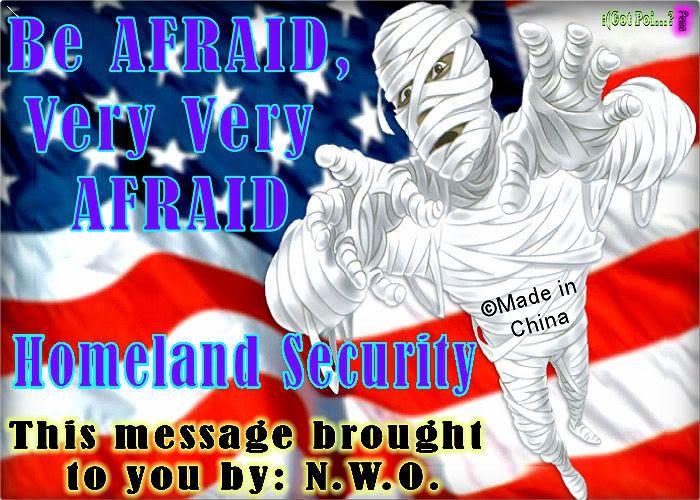
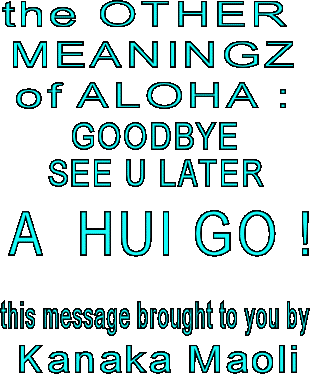 WHO'S HOMELAND are WE TALKING ABOUT!usa CONTINUES covert and overt opperations against the SOVEREIGN and NEUTRAL SOVEREIGNTY of the ILLEGALLY OCCUPIED NATION and Kingdom of HAWAI'I...UH with Dealing with usa and Military "Navy & Monsanto Co." brought Agent Orange and G.M.O., just to name a few ! to Poison our AINA, thus POISON US, IS HEWA !RE: UH is chosen as site for new security center
WHO'S HOMELAND are WE TALKING ABOUT!usa CONTINUES covert and overt opperations against the SOVEREIGN and NEUTRAL SOVEREIGNTY of the ILLEGALLY OCCUPIED NATION and Kingdom of HAWAI'I...UH with Dealing with usa and Military "Navy & Monsanto Co." brought Agent Orange and G.M.O., just to name a few ! to Poison our AINA, thus POISON US, IS HEWA !RE: UH is chosen as site for new security center

 Planning Commission approves comments for La'au EISBy: David Lichtenstein. Molokai Times, 25 February 2008The Molokai Planning Commission reconvened its meeting of Feb. 13 on Feb. 19 to finalize its comments submitted to Molokai Properties Limited in response to the most recent Draft Environmental Impact Statement for the La‘au Point development plan.MoPC Staff Planner Nancy McPherson composed a letter based on the comments submitted to her from the commissioners. Along with that will be written submissions from Alton Arakaki, Steve Morgan, Glenn Teves and Kahualaulani Mick to be included with the commissioners' comments. Even after these submissions, commissioners still had questions about the language of the DEIS.“How do we define such things as ‘adequate?'” Commissioner Steve Chaikin asked McPherson. Chaikin wondered what requirements MPL would need to demonstrate to show adequate water supply for the project to create 200 luxury homes near Molokai's southwest corner.Chaikin also questioned how the conservation zones will be set up within the development area. McPherson said that subzones will be created in the Covenants, Codes and Restrictions to specify these areas.“These subzones are critical and haven't yet been determined between MPL and the DLNR (Department of Land and Natural Resources),” said McPherson. In discussing the CC&Rs, MoPC Chairman DeGray Vanderbilt wondered why MPL would have the ability to change the language within the CC&Rs.“The EC (Molokai Enterprise Community) Land Use Committee voted 22-0 that CC&Rs could not be changed,” said Vanderbilt. “That's already a major violation in my mind.”Commissioner Joseph Kalipi also commented: “The Molokai Ranch Master Plan is one of the greatest plans I have ever seen. The plan has many great incentives. But in saying that, it doesn't mean anything about whether or not it should go forward … a lot of activists are showing us what is not adequate in the plan.“In reviewing and understanding water, the plan will never be adequate unless we can resolve these issues … There are other things that if we can't figure out we shouldn't even go to second base. We can't have an actual analysis (of water) if we don't know the present resource,” said Kalipi.Commissioner Lynn DeCoite was critical of MPL, doing business as Molokai Ranch, in her comments: “Molokai Ranch does not want to work with us. What does that say when they withdraw from the Water Working Group?” Molokai Ranch had recently withdrawn from the WWG, a group of local, county and state water stakeholders, citing existing legal questions over water use that need to be resolved before they will participate. When DeCoite became critical of Molokai Ranch, Chaikin cautioned the commissioners to remain neutral and reserve judgment on the larger issues of the development.He reminded the commissioners to just focus on the environmental impacts that the plan presents. “If we act prematurely things may come up and that may create problems down the road,” said Chaikin. To gain a better understanding of some of the relevant water issues, Chaikin asked if the U.S. Geological Service could make a presentation to the MoPC in regards to their studies of Molokai water.Vanderbilt mentioned that the USGS has been part of the WWG and any documents that come from this group can be shared with the commissioners. Chaikin then raised the question of why MPL would submit the DEIS during the Makahiki season. It was suggested that this may have been culturally insensitive to the people of Molokai. A motion was passed unanimously for this question to be asked of MPL.
Planning Commission approves comments for La'au EISBy: David Lichtenstein. Molokai Times, 25 February 2008The Molokai Planning Commission reconvened its meeting of Feb. 13 on Feb. 19 to finalize its comments submitted to Molokai Properties Limited in response to the most recent Draft Environmental Impact Statement for the La‘au Point development plan.MoPC Staff Planner Nancy McPherson composed a letter based on the comments submitted to her from the commissioners. Along with that will be written submissions from Alton Arakaki, Steve Morgan, Glenn Teves and Kahualaulani Mick to be included with the commissioners' comments. Even after these submissions, commissioners still had questions about the language of the DEIS.“How do we define such things as ‘adequate?'” Commissioner Steve Chaikin asked McPherson. Chaikin wondered what requirements MPL would need to demonstrate to show adequate water supply for the project to create 200 luxury homes near Molokai's southwest corner.Chaikin also questioned how the conservation zones will be set up within the development area. McPherson said that subzones will be created in the Covenants, Codes and Restrictions to specify these areas.“These subzones are critical and haven't yet been determined between MPL and the DLNR (Department of Land and Natural Resources),” said McPherson. In discussing the CC&Rs, MoPC Chairman DeGray Vanderbilt wondered why MPL would have the ability to change the language within the CC&Rs.“The EC (Molokai Enterprise Community) Land Use Committee voted 22-0 that CC&Rs could not be changed,” said Vanderbilt. “That's already a major violation in my mind.”Commissioner Joseph Kalipi also commented: “The Molokai Ranch Master Plan is one of the greatest plans I have ever seen. The plan has many great incentives. But in saying that, it doesn't mean anything about whether or not it should go forward … a lot of activists are showing us what is not adequate in the plan.“In reviewing and understanding water, the plan will never be adequate unless we can resolve these issues … There are other things that if we can't figure out we shouldn't even go to second base. We can't have an actual analysis (of water) if we don't know the present resource,” said Kalipi.Commissioner Lynn DeCoite was critical of MPL, doing business as Molokai Ranch, in her comments: “Molokai Ranch does not want to work with us. What does that say when they withdraw from the Water Working Group?” Molokai Ranch had recently withdrawn from the WWG, a group of local, county and state water stakeholders, citing existing legal questions over water use that need to be resolved before they will participate. When DeCoite became critical of Molokai Ranch, Chaikin cautioned the commissioners to remain neutral and reserve judgment on the larger issues of the development.He reminded the commissioners to just focus on the environmental impacts that the plan presents. “If we act prematurely things may come up and that may create problems down the road,” said Chaikin. To gain a better understanding of some of the relevant water issues, Chaikin asked if the U.S. Geological Service could make a presentation to the MoPC in regards to their studies of Molokai water.Vanderbilt mentioned that the USGS has been part of the WWG and any documents that come from this group can be shared with the commissioners. Chaikin then raised the question of why MPL would submit the DEIS during the Makahiki season. It was suggested that this may have been culturally insensitive to the people of Molokai. A motion was passed unanimously for this question to be asked of MPL.


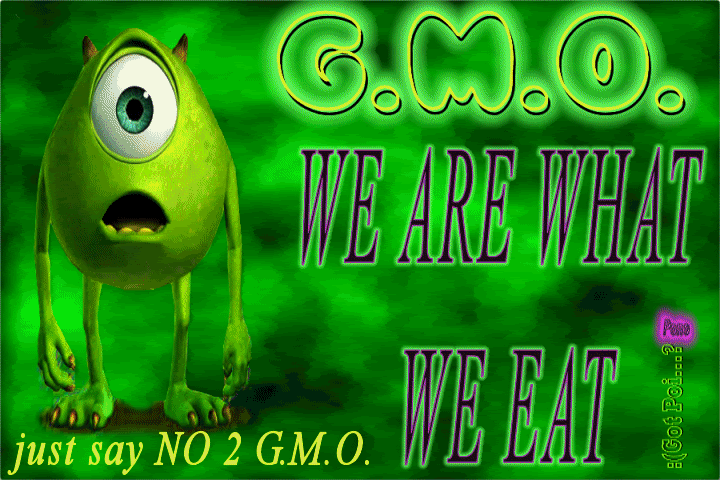 Labeling Genetically Engineered Foods (Hawaii)
Labeling Genetically Engineered Foods (Hawaii)http://www.thecampaign.org/forums/showthread.php?t=1098
KHON-TV
By Tammy Mori
Feb 24, 2008
Genetically engineered farming is a growing industry in Hawaii.
And many of us don't even know when we're eating genetically modified food, also known as GMO's.
But a new bill may change that and require all genetically engineered foods sold in Hawaii to be labeled.
Senator Mike Gabbard says consumers should be given the right to choose what they're buying.
Some call Hawaii the world capitol for genetically engineered crops.
The ideal climate has attracted companies like Monsanto, DuPont and Dow to set up shop.
But their biotech practices have always raised some question marks for some...
"There are new allergies coming up these days. I want to know why, what are they putting in the foods," questions Penelope Perez, a concerned mother who started the group Hawaii Citizens for Food Choice.
Along with producing unknown allergens in foods, some worry GMO's lose their nutritional value, or even weaken the body's immune system.
"This is not about the controversy whether genetically engineered foods are good or bad," says Senator Mike Gabbard.
"We have the the right to decide what kind of food we put into our bodies," he adds.
And 4000 Hawaii residents signed this petition saying they would like the right to choose as well.
But labeling these crops could prove detrimental to the growing seed crop industry..
an industry that employs more than a thousand people in our state.
And Hawaii's State Department of Health says there's no proof that GMO's are dangerous.
"If there's nothing wrong with the GMO fruit, than why not spend the money to educate people," says Gabbard.
"I dont know enough about the things they're putting in the food. So I want to know which foods have the so I can have the choice either to look into it and still choose to get them or decide it's not what i want for my family for myself," says Perez.
Gabbard says in order to keep senate bill 3232 alive, it needs to be heard and passed out of the committees by this Thursday.
